#Parlons peu et bien. Le temps c'est des sesterces.
Note
🌻
I was rereading Astérix et le Chaudron this evening because, well, I was in a foul mood, and it's my favourite volume. In light of this, I feel like chatting about Moralélastix!
It's no secret Moralélastix is a foil to Astérix, as one can observe from appearance alone. Moralélastix is like a more "unkempt" version of Astérix with other distinguishing features kept the same; same sword, moustache, hair colour, winged helmet and so on.
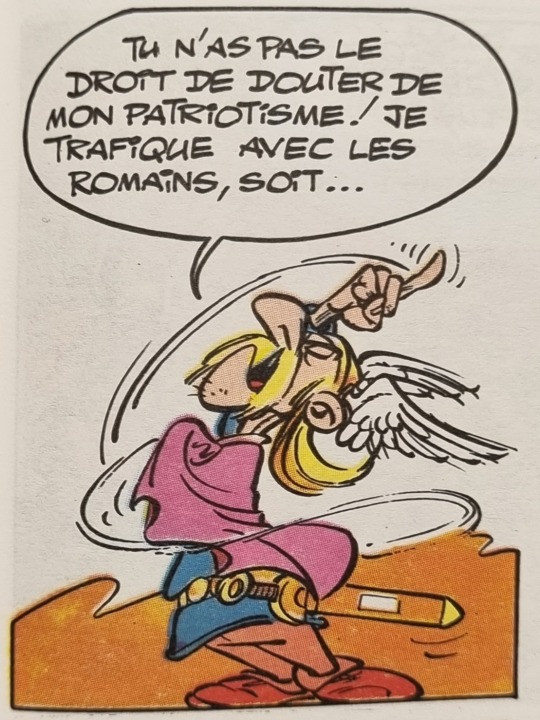


They even have a sword fight which, I believe, is the first time Astérix did that in the series! (Perhaps why he didn't fare so well.)
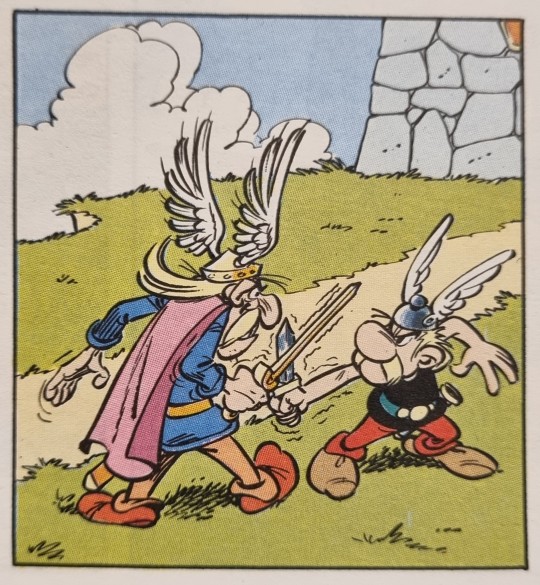
It's worth examining how their behaviour contrasts one another; as the presence of Moralélastix gives us insight into who Astérix truly is, as a moral figure. In that way, Chaudron was a growing stage for the series, solidifying what it actually meant to be Astérix.
They are effectively identical in that they're both cunning individuals, generally seeking to hoodwink those they dislike or see as otherwise beneficial to screw over.
For Astérix, that means the Romans bien évidemment, as the top warrior of the village whose sole defining trait is resisting Roman rule. Because Astérix couldn't care less about the Romans' integrity nor does he hold any respect for their honour, his intelligence-based escapades rely on exploiting the Romans' very own acts. This happened, for instance, in the volume prior, Astérix aux Jeux Olympiques:
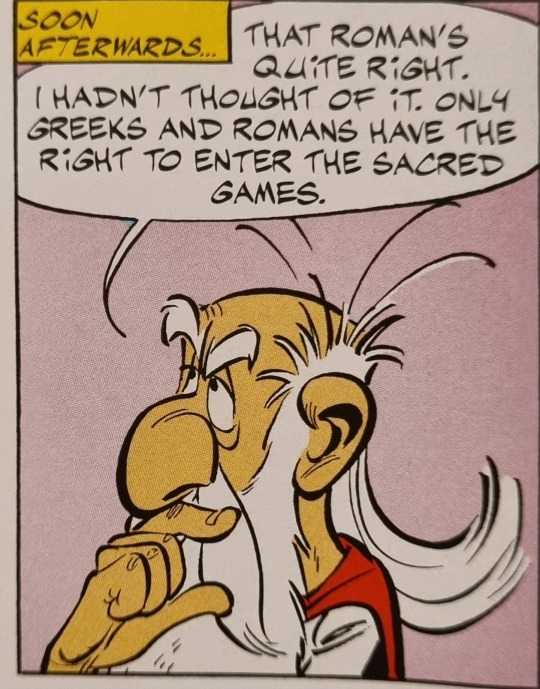

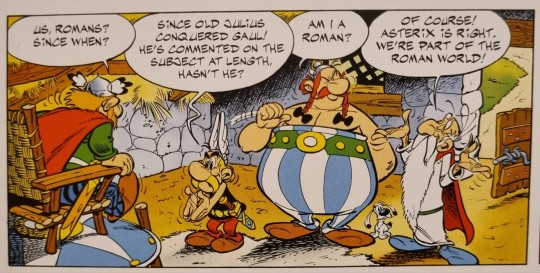
The Romans can't nominate these Gauls for disqualification from the Olympic Games, as this would be to concede that the indomitable Gauls are not conquered; and the fiction that they are conquered is one they seek to maintain. Hence how Astérix uses his cunning to trap the Romans in their little victory lap. (He also exploits the Romans' disposition to dishonesty and foul play to have them disqualified later.)
This is where Moralélastix as a foil comes in. What Astérix does to the Romans is what Moralélastix does to Astérix and the rest of his village. The principles are the same; use a back-door approach (literally) to swindle them, then exploit their pride and behaviour in your own favour in such a way they cannot disagree without conceding defeat in the process.


Since the indomitable village takes its honour seriously (ad extremum, the Romans might say) - indeed, a facet of its identity as the only Gaulish village that is not Roman - Moralélastix exploited this pride knowing that Astérix, as a proud warrior of that village, "ferait l'impossible" to keep it intact, thus giving Moralélastix what he wants. Exactly like how Astérix exploits points of weakness for the Romans in order to get what he wants.
Thus the question becomes: who is to say Astérix is, on principle, any better than Moralélastix? Most people reading it are happy to simply respond with "well, the Gauls are the goodies and the Romans are the baddies, so...". In a sense, that's a perfectly reasonable answer.
But as someone who likes to go into greater detail, I find that the foil shines a light on key differences which, consequentially, fleshes out nuances of Astérix's character and makeup as le héros de ces aventures.
It is obvious, and I mean it literally: money. Astérix is unintelligent in one area only: money. He doesn't understand it, doesn't want to, and he is all the better for it. Moralélastix's morals are so elastic because he wants to stay in the good books of Romans while keeping as much money as possible.
In this way, it might be why Astérix has such a bad time in this volume, where he is (unlike other entries) the butt of most jokes, the swindled rather than the swindler. He is out of his depth here. He sells 14 boars for five sesterces, he bets all his money away because some random guy told him to, he even says that telling stories of his and Obélix's adventures would "never make any money".
You might even go so far as to say the reason Astérix has such a hard time in Chaudron is that he has to behave like Moralélastix. Consider the cover, versus Moralélastix himself:
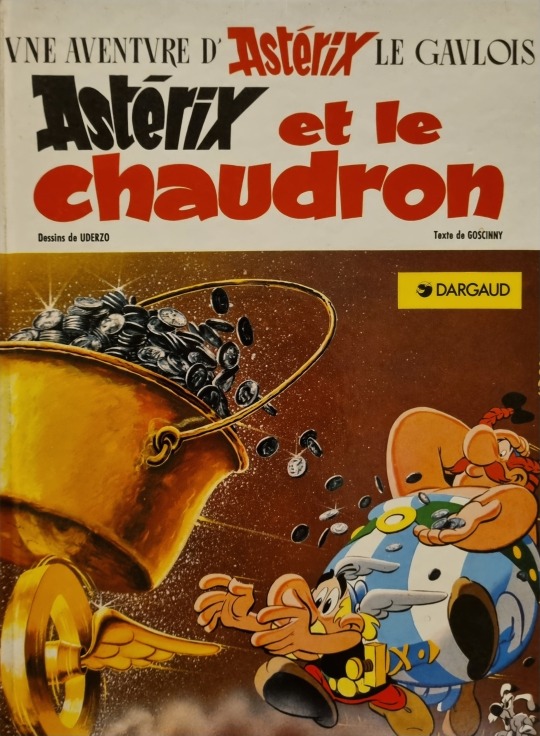
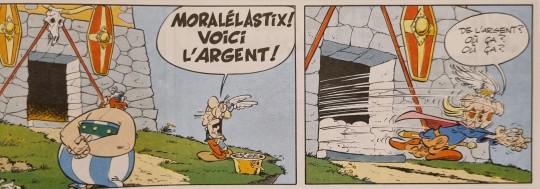
Who else behaves in a similar way to this imagery? Well...
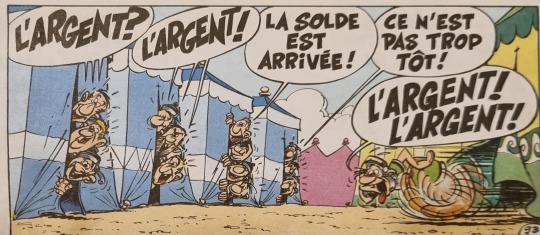
The Romans.
Sure, "Moralélastix is more Roman than Gallo-" is hardly a ground-breaking take. That is, after all, the entire point of him, a sort of Aplusbégalix II. But more specifically;
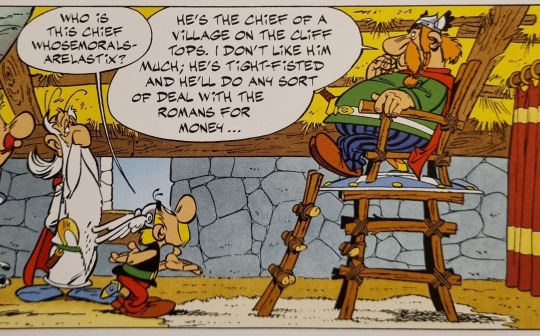
In a way, Moralélastix is "in the Romans' good tablets" because he is as interested in money as the Romans are; excessive trade, deals and so on, to the detriment of Gaulish patriotism and (evidently, seeing the plot of Chaudron) solidarity.
In that sense, it can be argued that Astérix's lack of interest in money, while literal, also serves a thematic purpose; he is the hero because he resists not just Romans as a people, but Roman culture in its every form. As discussed before, that means their conflated self-image, their desire to conquer everything, their convoluted approach to life satisfaction... but as introduced in Chaudron, it also means what money represents. Greed, a lack of honour, a lack of respect for common decency and morals (indeed, turning them elastic).
And why Moralélastix, despite "winning" the sword fight, loses his moral high ground in the most literal sense (position morale élevée):

Now, is all this fancy thematic work why Astérix et le Chaudron remains my favourite Astérix comic...? I wish I were that sophisticated. Everyone knows the real reason. But the way in which it achieves such storytelling and character-building truly is impressive. Perhaps it truly is the best Astérix comic, outside of my bias. Who is to say?
#hi de ho#Asterix#^^ putting it in the tag because this was great fun#Astérix et le Chaudron#Asterix and the Cauldron#Astérix#Parlons peu et bien. Le temps c'est des sesterces.
90 notes
·
View notes
Note
What breaking bad characters would the asterix characters be to you. lwhat would an asterix x breaking bad fusion be like
This is perfect! BrBa was my SpIn back in, I think, October 2021?
The issue is that the crux of BrBa conceptually is about Walt doing what seems best to him in a society full of overwhelming, unachievable and conflicting expectations. Meanwhile, the Gauls' resistance ensures they aren't beholden to any similar standards of success or responsibility. The Romans, for sure. The power drunk Centurions do this all the time. And magic potion being dumb metaphor etc etc., it'd have something to do with it.
So a fusion would probably be a Roman with a less-than-Senator/César position selling MP on the black market or the like. That would probably be more akin to the Jesse kidnapping arc at the end but, it'd still be a fusion of sorts.
The issue is that the MP doesn't actually have any effects for which crystal meth is typically sought out; that is, pleasure and energy. The MP doesn't actually make you more energetic or happier or anything - not inherently, anyway. The only reason anyone (the Romans, point blank) would want it is so they can defeat Astérix et al and claim some sort of reward or promotion, or to start a terrorist militia to take over Rome and overthrow César themselves. None of this can be a secret for very long, unlike BrBa, where much of the tension for Walt is in the hiding.
This being said, Sulfurix in Le Secret de la Potion Magique comes awfully close. He seeks a young apprentice, Téléférix, who certainly can be perceived as a "Jesse" for that he's trained and used by Sulfurix for production of the MP, with the goal being to reclaim glory he believes is rightfully his and use the MP to further his own agenda.
So I guess the short answer is Sulfurix and Téléférix are a Jesse and Walt.
20 notes
·
View notes
Note
what is the gayest piece of official asterix media😨
Oh my god I accidentally just posted it without even seeing it. But I feel like rambling about them today, so I'm going to make a little compilation!
First of all, this official promotion art by Uderzo! If my memory serves, this was made for Christmas time and some versions have mistletoe above it.
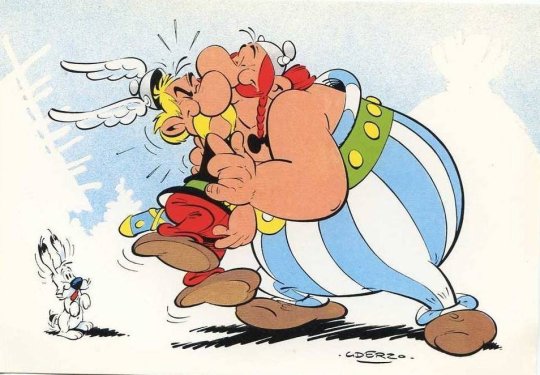
And he kissed Astérix for real in Le Papyrus de César! (Ignore that the quality is ass).
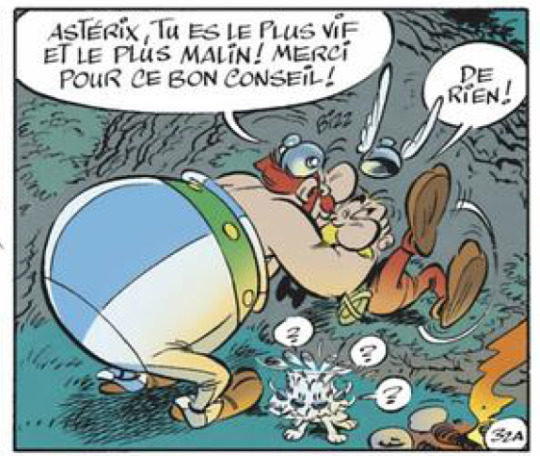
"Astérix, you're the smartest and most cunning person [in the world]! Thank you for your good advice!" "No worries!"
They do kiss again in La Rentrée Gauloise, but the entire joke is that Obélix kisses Astérix because he's annoyed he didn't get to kiss Falbala, so in context it isn't as gay as you probably want.
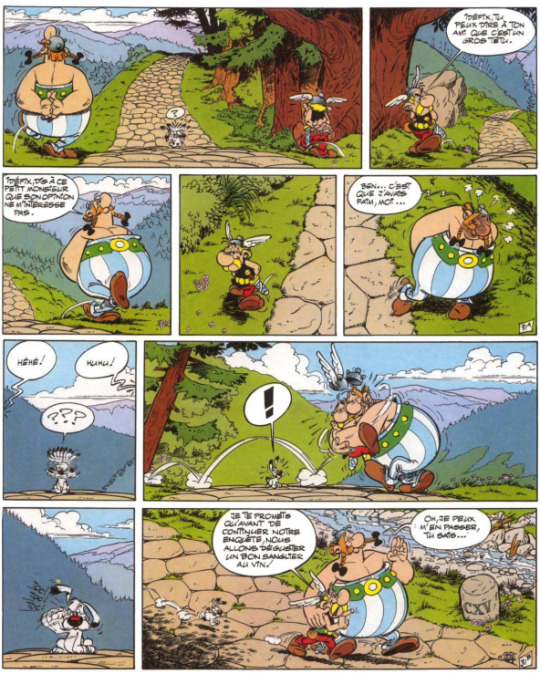
I also love this little bit from Le Bouclier Arverne ! They have an argument because Astérix fucked up majorly in a way I can't be bothered explaining, and they refuse to speak to each other for a whopping two frames! Before Astérix looks at him knowingly and Obélix blushes. Feat. Idéfix who Knows what they are.jpg
Let's also not forget the straight up drunken "I love you" LOL.
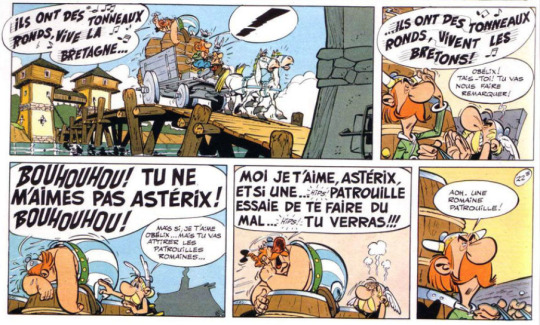
"Obélix! Shut up! You're going to get us seen!" "BOOHOOOHOO! You don't love me, Astérix! BOOHOOHOO!" "No, I do love you, Ob'élix... but you're going to attract the attention of the Roman patrols..." "Well, Astérix, I love you, and if a... *hic!* patrol tries to hurt you... *hic!* you'll see!"
And "bonne nuit beau gosse", which means "good night, hot stuff".
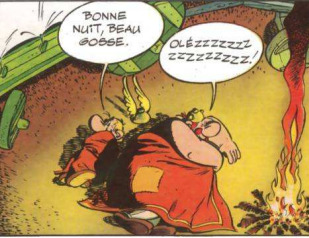
If you want a whole book that's effectively confirming their marriage, Le Fils d'Astérix (Asterix's Son) is probably best, even if it almost breaks their marriage, ha.

Panoramix: He has, with no room for doubt, chosen you two as his adoptive fathers! Astérix, Obélix, you now carry the weighty responsibilities of parenthood for this child. Watch over him well!
Assurancetourix: I shall now compose an ode to the joy of fatherhood!
And now, my absolute favourite. Astérix et le Chaudron. Astérix is exiled from the village for ruining their honour (long story). Obélix immediately exiles himself as well, which results in Astérix crying, "my Obélix!"
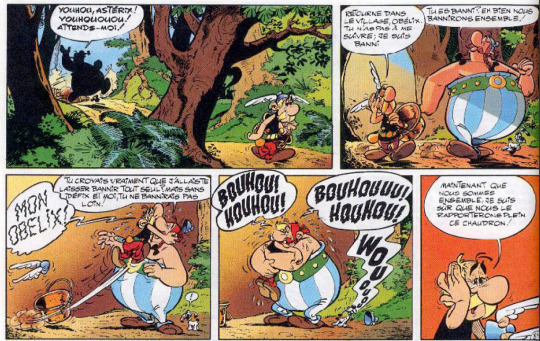
Obélix: Yoohoo, Astérix! Yoohooooo! Wait for me!
Astérix: Go back to the village, Obélix. You don't have to follow me. I'm banished.
Obélix: You're banished? Huh! Then we'll banish together!
Astérix: My Obélix!!
Obélix: Did you really believe I'd have let you banish all by yourself? Without me and Idéfix, you wouldn't banish far!
[crying etc]
Astérix: Now that we're together, I'm certain we're going to be able to refill this cauldron!
Moreover, when Astérix resigns himself to the fact that he'll never be able to un-banish himself (i.e. not be able to fulfill the required task to have him allowed back), Obélix promises he'll stay by his side forever.
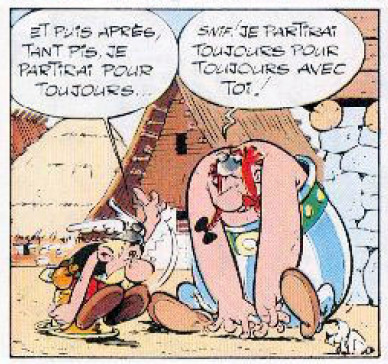
Astérix: And then, oh well. I'll leave forever...
Obélix: *Sniff!* I'll always leave forever with you!
There's more, but I fear laying it on a bit thick. I hope this answers your question!
38 notes
·
View notes
Note
I had this article in my google "feed" and I just?? Pourquoi anti pensée positive? Tu aurais une idée?

MDRR la citation m'intéresse, c'est possible que ce soit qqch que Fabcaro a dit lui-même sans contexte, par exemple "Je trouve qu'on veut que les pensées positives, on laisse personne se plaindre", ou quoi. En plus on sait que l'album aura un Abraracourcix de très mauvaise humeur, mais on sait pas pourquoi en ce moment. Peut-être l'auteur de cet article croit qu'il en a marre de Bonemine qui dit de toujours penser positivement ? Elle fait pas ça vraiment mais vu que "du comportement bizarre" (j'oublie la citation mais c'était plus ou moins ça) fera parti de cet album c'est peut-être le raisonnement.
Mais autant que je sache, l'album parlera de "nos obsessions modernes", et l'extrait s'agit de La Bonne Santé™️, toutes les règles qui ont l'air de venir de n'importe où, que tout le monde enseigne à Astérix et Obélix. Très intéressant en soi mais critiquer les idées modernes qui prennent de l'ampleur à l'époque dans la société française est le but d'Astérix, peu importe l'époque en question. Ce pourrait être n'importe quelle chose. La pensée positive ? Peut-être, je devine, mais peut-être également les influenceurs ou les journées de santé mentale ou les pubs avec un million de clauses de non-responsabilité ou ou ou.
8 notes
·
View notes
Note
Dude yes please deliver The Gaylois Ramble™ I would love to hear your thoughts on the way it shapes and affects the Astérix narrative (if you're still up for it, that is. No pressure if not)
I'll always be up for some Gaylois truthing! (For all still unaware, Gaylois = Astérix x Obélix, generally romantically).
I don't really think Gaylois is canon or even the intention (I think if you had tried to explain that interpretation to Goscinny he'd have looked at you like you were nuts). However, I do believe viewing Astérix and Obélix as life partners, who will always spend their lives and adventures together, serves to enforce some of the implied themes, or morals, of the Astérix books. As a dude who likes dudes, I always read that sort of relationship as at least semi-romantic, some don't. But for the sake of brevity, I will refer to all nuances in such a relationship - platonic, romantic, somewhere in between - as "Gaylois", as it's still a little gay, innit.
With that out of the way, here is what I reckon.
What makes Astérix's village special, capable of forever holding out against the Romans? The magic potion, you'd say. And that's largely correct; if it weren't for the potion they would have been conquered like everyone else and they'd have very little they could do about it.
But that can't be all it is. There are quite a few entries in the series involving problems which cannot be solved with magic potion - indeed, if that was all there was to the conflicts in Astérix, there would never be a volume longer than a few pages. Much of the tension mounts and falls - to the extent that their ongoing resistant hinges on the fact - from the amount of solidarity the Gauls have with one another.
Consider, say, Caesar's Gift. Indeed, the Gauls become so caught up in their election that they become open to attack, of which the Romans take advantage and very nearly conquer the village. Or Obélix and Co., where the Romans introduce unprecedented levels of greed and individualism that economics brings, so that the Gauls become divided and pre-occupied with beating one another; ultimately so that they are unable to fight invasion. Or even, for an easy example, The Roman Agent? The book states it quite plainly: "everyone is suspicious of everyone [...] and that evening, at the banquet, nobody talks to anybody else [...] it would appear [therefore] this is the end... the end of the village!".
However, the village ultimately overcomes these issues. While the magic potion is imperative to their resistance - and in this sense, their very identity - it is not all that makes them such a force to be reckoned with. Put simply, for all their fighting and differences, they are one unified force against the invaders. They like to fight amongst themselves, but they love each other, and this is what makes them Gauls (see Great Crossing).
Astérix and Obélix are in many ways the embodiment of this concept; as you would likely hope, seeing as they are the protagonists. Indeed, any time they've "fought" so to speak, it never actually becomes literally resolved so much as they recognise they're both stubborn for no particular benefit and simply look at each other, laugh a bit, and hug to make up. In any particularly dangerous situation, their main priority is the other, to the extent that them being split up is always a precedent to danger (the Banquet, Great Crossing) even if voluntary (the Normans) except for one time (the Gaul). In that sense, their being opposites is even more the catalyst for their relationship strengthening, than triggering arguments; Obélix needs Astérix for his cunning and Astérix needs Obélix for his strength.
The general pattern, as I hope is somewhat clear amidst these rambles, is a devotion of life partnership and one's being imperative to one another, amidst differences that are frivolous when weighted with the importance of their relationship. This draws distinct parallels, again, to the themes regarding the village as a whole. Like a big family, they stick together despite their frivolous bickering, because they love and respect each other, and they are stronger for it.
Not that these ideas are only represented if Astérix and Obélix are romantically interested in each other, but certainly, I feel, best represented if they are together for life, which for many people (including myself) means more or less the same thing, and is why I interpret it as such (beyond, say, the actual flirting). Astérix and Obélix can't go their separate ways because their very identities demand one another; short of, I suppose, them retiring as warriors. Even if they weren't intended to be read as romantic partners, it would seem Albert-René are aware of how they have to be each other's most important person, as it is explicitly stated within several volumes that Astérix and Obélix feel "too young" or "not ready" to marry a woman (Great Crossing, the Actress) despite how the rest of the village seems to think it's about time they do so if not overdue (Roman Agent, Golden Book) - i.e. they cannot have an actual partner for now, as the stage of their lives where they choose to spend their time with one another is inconducive with marriage.
I suppose what I am trying to get at with this is that ideals you typically might hope for within a relationship - knowledge you love each other even when you have petty disagreements, standing up for each other despite against whom it may be, complementing each other's strengths and weaknesses - are observable within Astérix and Obélix's relationship, because they are also the ideals that form the tight-knit, yet ever hilarious, community of Gauls in Brittany.
32 notes
·
View notes
Note
🌻
I actually wanna talk about Le Galère d'Obélix again. So, this volume was created well after Goscinny's death, in 1996 (Goscinny died in '77). To me, and I think to a lot of others, it's very evidently a volume in which Uderzo is processing his grief. As Astérix himself has said Goscinny and Uderzo are his two fathers, for Uderzo to work on Astérix necessarily is a reminder of Goscinny, so I think it makes sense he'd do that.
The plot is effectively that Obélix "dies" (is turned to stone) and, of course, this seems to signal the end of Astérix adventures. Astérix goes so far as to ask, "what's going to become of Dogmatix and me, if you stay in stone forever?"

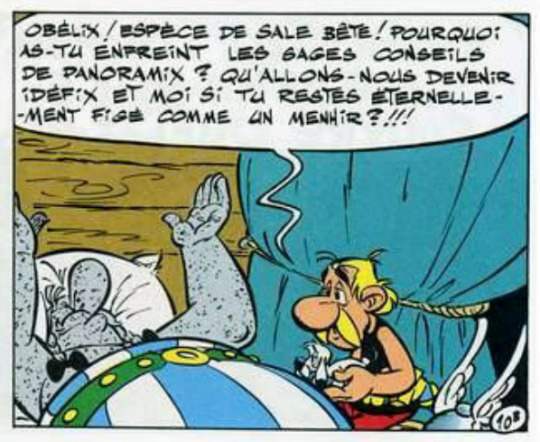
I could describe the whole plot, but that would take a while - TL;DR Obélix is revived, but stuck in the body of a child for a while, and doesn't grow back into his actual body until the Romans knock Astérix out and threaten to kill him (throw him to the sharks). Obélix says later it was likely because he saw Astérix in danger that he snapped back to normal - so he could save him.
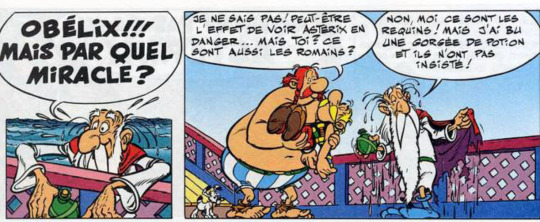
In this way it quite obviously draws parallels to Uderzo's choice; he was going to abandon Astérix as well (if my memory serves), but chose not to let it die, and in that sense keeps Goscinny alive.

24 notes
·
View notes
Note
Do you have a strong opinion on the Uderzo comics?
Thank you for asking! I've actually had a few thoughts flying around my head for a while about this so I'm appreciative of someone giving me a chance to ramble about them.
I honestly like them. They're nothing to write home about, but I genuinely enjoy quite a few: Le Grand Fossé, L'Odyssée d'Astérix, and La Galère d'Obélix isn't too bad either... and I actually genuinely enjoyed La Rose et Le Glaive and can respect him trying something new.
But I feel like a lot of context is lost when discussing them. "The writing isn't as good/isn't the same". Uhm, duh? Uderzo was the illustrator. I don't think anyone would be nearly as offended by this fact if it were Goscinny who had to do the drawings himself, with people crying "why doesn't it look as good!". Uderzo hadn't spent nearly 20 years up to that point writing the books. Even the writing in the collaborative days took several years to grow into its greatest stuff, if you ask me. To expect Uderzo to perfectly replicate a style that had been developed over years and years by someone whose craft was not that of Uderzo is just... silly.
The fact that entries like Le Grand Fossé and L'Odyssée are (for the most part) so in line with the tone from the first 24 is in and of itself quite the feat. To be sure, it's not perfect. The resolution of the Le Grand Fossé plot feels a bit wrong, because it sort of just happens: the Romans are defeated not because of any cunning but because of unforeseen side effects to the magic potion nobody mentionned until later, Ségregationix and Tournedix stop fighting because they just so happened to be the same in strength. Compare this to, say, Jeux Olympiques, where it's Astérix and Panoramix's plotting that actively brings about the Romans' loss all the while making a point about their dishonesty. But things like "le village, c'est moi", neutral families splitting their house and falling into the rift, Obélix crying at love stories, etc etc; that feels right, that feels Astérix.
Other stories like Le Fils d'Astérix are fun on their own, but you can't help but wonder what exactly the point was; other stories involving raising children within the stories are closely related to how it actually feels to raise children. Sure, it certainly implies raising a newborn is not easy, but it feels less like a caricature of that fact and rather a hypothetical story where it's even harder. It isn't exactly a satire of anything in particular that the entire Roman army is trying to kidnap a baby.
I think the best way to summarise it is that the original 24 books were a "it's just like", whereas Uderzo era was a "what if". What if life was like this? Not "the humour is in that these ancient people are acting just like we do".
And, I hate to bring it up, but... the emotional implications, you might say, of continuing Astérix at all likely contributed to the descent into cynicism the series took under Uderzo's watch. Around about Latraviata, it starts to feel like Uderzo doesn't really care; the characters act strangely, gags aren't repurposed but rather recycled, the story does nothing of note except, I suppose, the reference to the Oscars at the end. Nothing feels logically connected, either; ideas are sort of just thrown in, in any order.
And to that I say: of course? Goscinny was one of Astérix's fathers. The process was collaborative not only because they worked efficiently together but because they were best friends. The series is a representation and product of their friendship. Yes, you can take that out of the equation at some stage, and yes, it would still keep going, but it loses the love behind it. It's hard to have a good natured laugh by yourself. Especially when coupled with that it's not just as though Goscinny quit, he died, and somewhat young as well; I don't think it's fair to be mad at Uderzo for eventually becoming cynical and uninterested in the series that represents the time he was alive. That's grief, son!
So I guess my main thoughts are that it's important to maintain sympathy for Uderzo throughout all this. Sure, good writing is nice, and it's why we love Astérix, but it's not really reasonable to expect it to be the same after Goscinny's passing.
8 notes
·
View notes
Note
I’m Latin American, but the only Asterix book I have (Asterix in Belgium) is in SPANISH Spanish. And a funny thing is that basically all the names (except I think Cacofonix??) were left as their original French names (with some sliiiiight modifications so they could be pronounced according to Spanish grammar). That means Idéfix is still Idéfix in Spanish.
Anyways this was a very long way to tell you that I find this decision dumb as hell because this way the name puns make NO sense to Spanish readers unless they’re fluent in French so there’s no point to them. Team Dogmatix all the way lol
This fascinated me, so I went to a-o.nl and found the three Spanish versions. I have no idea why they're shipping you lot the original Spanish, because the Latin American versions very much exist.
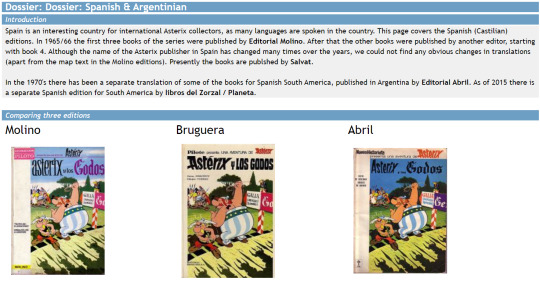

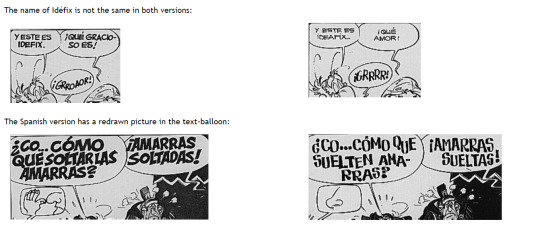
I don't speak Spanish, but you're 100% right about the puns if the "big nose" panel at the end is anything to go by, as to my knowledge, it doesn't rhyme with "amarras". Unless it's saying something else entirely. That's a huge shame.
4 notes
·
View notes